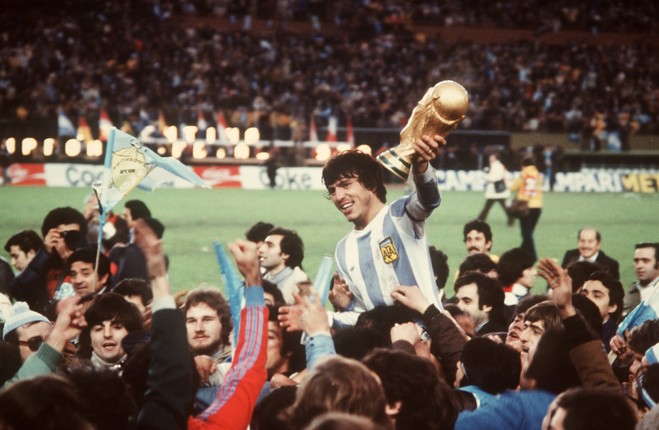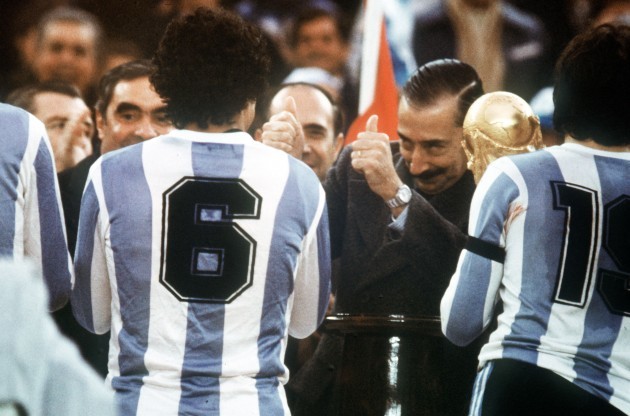LAST UPDATE | 9 Mar 2021
IN BAD NEWS for the putative UK/Irish bid, a South American proposal encompassing Argentina, Uruguay, Paraguay and Chile is seen as the favourite to win the rights to host the 2030 World Cup.
If it’s successful it will return the competition to Argentina for the first time since 1978, arguably the most fraught and controversial edition of the competition’s history.
Reflecting on the tournament ahead of the 2018 kick-off in Russia, The Irish Times called the ’78 World Cup “shameful”; Esquire described it as “the dirtiest World Cup of all time” and on a previous episode of Behind the Lines, ESPN’s Wright Thompson wondered if part of Diego Maradona’s mythology was that Argentina invested the ’86 World Cup with twice the emotion and importance as a way of obscuring the complicated memories of ’78.
Suspicions of match-fixing cling to a competition seen as massaging the image of Argentina’s brutal military junta, which had seized control two years earlier and were ultimately responsible for the torture, killings and disappearances of an estimated 30,000 people whom they perceived as dissidents.
The ’78 World Cup has drawn comparisons to the 1936 Olympics in Hitler’s Germany and Fifa were certainly characteristically uninterested in the thornier aspects of their bringing the World Cup to the country, pointedly refused to accept on the eve of the competition an Amnesty International report on human rights abuses in Argentina.
There is an irony in the fact Argentina was awarded the tournament in 1964, more than a decad before the dictatorship ever came to power. The junta nonetheless elected to press ahead with hosting the tournament, and said there would be a hiatus in the horror as General Jorge Videla declared the World Cup would be “played under the sign of peace.”
The competition ultimately provided the junta with their ideal image, as the ticker tape swirled in El Monumental and Videla handed the trophy to Argentina’s captain, Daniel Passarella.
Argentinian writer Marcela Mora y Araujo is our guest on this week’s episode of Behind the Lines, and she explained that World Cup’s complex place both in its context and the country’s history.
- To get access to the archive more than 60 BTL episodes – featuring Wright Thompson, David Walsh, Diane K Shah, Michael Foley and many more — join The42 here
If the junta’s aim was to drown out criticism and draw attention away from their acts, they succeeded. After the final, Marcela’s father took her into Buneos Aires to celebrate, where they made it only so far before meeting jubilation’s gridlock.
On the same stretch of road, Marcela discovered later in life, was a woman called Graciela Daleo.
Graciela was a detainee at a torture centre next door to El Monumental. She was forced to watch the final, and was then taken out by her torturers and told to celebrate the nation’s victory, at one point allowed to stand and poke her head through the car’s sunroof.
“She saw that sea of people”, recalls Marcela, “and thought, ‘If I start screaming, ‘Help me, help me, I’m a disappeared’, would anyone hear me?’
“Which of course they wouldn’t.”
She was then taken to a restaurant by her torturers, and in what Marcela describes as her “single act of resistance”, went to the bathroom and scrawled ‘Help me, I’m a disappeared’ in lipstick on the mirror. She returned to her table, and then to incarceration.
So how does that World Cup endure in Marcela’s memory? Is it irreparably tainted by its association with the murderous junta?
“One would like to think, of course, ‘if only you had bumped into me at that time of great trouble, I would have solved your problem’, or my Dad would have said something to the police. But, in fact, there is a powerlessness to what we can do which is really difficult to stomach.
“It would be easy to say, ‘How dare I celebrate that World Cup now knowing what was going on on the same stretch of road’. But I can’t do that. Because, for better or for worse, there was a truce. There was peace for a month. There were no bombs and no shootings and they say no disappearings, but the jury’s still out on that.
“For me personally, we owe those players two huge debts of gratitude. One for winning the World Cup, which is just such a fun thing to happen. And two, for being a part of this lull in the horror.
“It was a really, really awful time and in the middle of it there was a month of utter, utter fun and joy and I think that’s ultimately a good thing. If I was now to be asked should we have a World Cup in certain circumstances, I probably would say no.
“But the reason why the ’78 World Cup became tainted after the event is partly because of this sort of moralising, ‘How dare you be happy when something bad is going on’, which is one of the things that humans like to say to each other.”
Marcela’s recollections are are a testimony to the extraordinary emotive power of sport.
“Yesterday, someone rang me to say a CNN podcast is looking to find someone who didn’t rejoice and celebrate the World Cup because they had a relative or a friend that was disappeared or detained. I said, ‘Good luck finding that person’ because ultimately, the detainees were enjoying the football and they have written at great length about how weird this was for them.
“There was a perverse scenario where the torturer and the tortured would discuss the goals and matches between sessions. That is absolutely hideous, but it also speaks of the extraordinary thing that is football, so we can’t just ignore it, or judge it, or say ‘that’s wrong.’
“Football provokes a true emotional reaction in people that’s real, and is so real that we have to respect it, and use it for good.”
Listen to the interview by subscribing at members.the42.ie.


